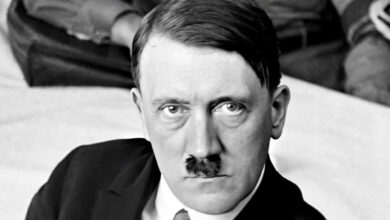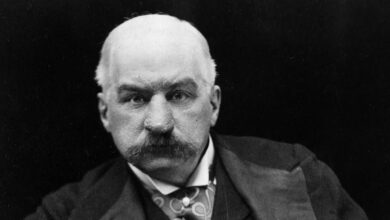Podcast: Play in new window | Download
Subscribe: Spotify | Amazon Music | Youtube Music | RSS
Eric Arthur Blair who would be later known as George Orwell was born on 15 June 1903 in Motihari which was at that time part of British India. When Eric was not quite one year old, on 13 March 1904, his mother, Ida Mabel Blair, took him and his sister Marjorie, who was five years older than Eric to Oxfordshire, England, where they settled in Henley-on-Thames. After Eric’s father Richard joined them, another sister was added to the family when Avril was born on 29 October 1908.
Eric and Marjorie received their early education at a convent school in Henley, following which a scholarship enabled Eric to attend St. Cyprian’s School in Eastbourne where he boarded for five years. He hated his time there but he stuck it out in order to get a scholarship to Eton where he remained until 7 December 1921, getting involved in the production of a college magazine before leaving just before his 19th birthday.
University was out of the question as the family couldn’t afford it and Eric’s academic performance meant that another scholarship was never going to happen. The family, therefore, decided that he should join the Imperial Police, which would later become the Indian Police Service. After cramming to pass the entrance exam he decided on a posting to Burma as his maternal grandmother still lived in Moulmein. By 29 November 1922, he had been appointed Assistant District Superintendent.
Whilst in Burma Eric contracted dengue fever and so he returned to England to recuperate. Although technically on sick leave, Eric decided against returning to Burma after he recovered and resigned on 12 March 1928, with the intent of becoming a writer. His experiences of life in the Indian Police Force influenced the 1934 novel Burmese Days and two essays, A Hanging, which was published in 1931 and Shooting an Elephant, which was published in 1936.
Later In 1928 Blair moved to Paris and started to write novels as well as provide political journalistic pieces which were published in Monde, with most of his focus being on the destructive forms of poverty. His experiences in Paris were not all positive. He fell seriously ill in 1929 and had to be admitted to hospital and shortly afterwards all his money was stolen from his lodging house. He later described his experience in hospital in the essay How the Poor Die, which was published in 1946.
After a two-year stint in Paris, he settled with his parents for the next five years at their house in Southwold on the Suffolk coast. He started to contribute regularly to the literary journal New Adelphi at this point whilst also contributing to other publications such as the New Statesman.
Whilst preparing Down and Out in Paris and London for publication he decided that he should publish it under a pseudonym to save his family from any embarrassment caused by the fact that he had spent time in Paris and London as a Tramp to provide him with suitable experience for writing the book. He eventually settled on George Orwell as it was a nice round English sounding name. Down and Out in Paris and London was published under the name George Orwell on 9 January 1933.
He set about preparing his next novel, Burmese Days for publication, whilst at the same working on a new one called A Clergyman’s Daughter, which was published on 11 March 1935. Burmese Days was published in June of the same year. This was followed by The Road to Wigan Pier in 1937. The first part of this book was a commentary on the social conditions in the North of England around Yorkshire and Lancashire. The second part of the book was a long essay that included notes about his upbringing but also included an argument for socialism. The book resulted in George Orwell being the subject of surveillance by Special Branch, which is part of the British Police service that deals with matters of national security, for the next 12 years.
In 1935 during some time spent in London, George Orwell had met Eileen O’Shaughnessy at a party that had been arranged by his landlady. On 9 June 1936, the couple were married but in December the same year, he decided to travel to Spain to fight in the Spanish Civil War on the side of the republicans. Due to his previous police training, he was quickly advanced to the rank of corporal but didn’t see much action until he reached the front where he was wounded in the throat by a sniper’s bullet. He received electrotherapy treatment but was declared unfit for service. By July 1937, Orwell was back in England and settled down to recount his Spanish civil war experiences in his book Homage to Catalonia.
In March 1938, George Orwell had another health scare and was admitted to Preston Hall Sanatorium where he was thought to be suffering from tuberculosis. To aid his recuperation and to avoid the British winter, he only stayed there until September, after which he and his wife travelled to Marrakech in French Morocco where they rented a villa near Casablanca. Whilst there, Orwell wrote Coming Up for Air.
He travelled back to England in March 1939 and Coming up for Air was published in June, the same month in which George Orwell’s father, Richard Blair died.
When the Second World War broke out, Eileen found work at the Ministry of Information in the Censorship Department, but although George submitted his name for war work, nothing was offered to him. He was declared unfit for any kind of military service by the medical board in June 1940 but got involved in the war effort by joining the Home Guard. In August 1941 he obtained full-time work at the BBC, supervising cultural broadcasts to India to counter the propaganda coming out of Nazi Germany. His work at the BBC also led him to enjoy more of a social life within his literary circle of friends, especially with those who were more aligned with left-wing politics. At the same time, Orwell started to contribute regularly to Tribune, a left-wing weekly publication. In early 1943, at around the same time as his mother died, George Orwell revealed to his friends that he was working on his next book, which turned out to be Animal Farm, which would eventually be published on 17 August 1945. His need to spend time on his new project and the revelation that hardly any Indians listened to his broadcasts resulted in Orwell resigning from the BBC in September 1943. He also resigned from the Home Guard on medical grounds.
In September 1944 the Orwell’s moved to a new home at 27b Canonbury Square in Islington, London where they were joined by an adopted son called Richard Horatio Blair. Orwell’s wife, Eileen, gave up her work at the Ministry of Information to look after him whilst early the following year George took up work for the Observer as a war correspondent. However, the war was almost over and so he never saw any action although he was present in Paris for the liberation of France. He also travelled to Cologne after its occupation by the allies. Unfortunately though, whilst there, Eileen was taken to hospital for a hysterectomy and whilst under anaesthetic she died on 29 March 1945 at the age of 39.
After the war, George Orwell continued his journalistic writing and started work on his next project, which was the future-set dystopian novel, Nineteen Eighty-Four. He also employed a housekeeper called Susan Watson to look after his son.
In May 1946 George’s sister Marjorie died and so shortly afterwards he and his sister Avril moved to an abandoned farmhouse complete with outbuildings called Barnhill on the Isle of Jura, which is in the Inner Hebrides of Scotland. He was joined later by Susan Watson and his son Richard. However, Susan and Avril did not get along and shortly after Susan’s boyfriend arrived who was a member of the communist party and clearly not liked by George, they both decided to leave.
On 19 August 1947, George suggested a boating trip which almost turned into a tragedy. Although loss of life was avoided, George nevertheless received a soaking which was not good for his health. By December he had become seriously ill and was diagnosed with Tuberculosis. Streptomycin was prescribed whilst he was in hospital in East Kilbride. He returned to Jura at the end of July 1948 and completed the manuscript for Nineteen Eighty-Four. The novel was published in June 1949 and was an instant commercial and critical hit.
At around the same time, George Orwell started to see a woman called Sonia Brownell and the couple were engaged in September. George’s health though was still in decline, and he had to be admitted to University College Hospital in London. Sonia stayed by his side and took charge of his affairs and she and George were married in his hospital room on 13 October 1949.
He received various visitors over the next few months including Lucian Freud and Evelyn Waugh. Plans were made for George to visit the Swiss Alps in the hope that the mountain air would help recovery, but these plans were never really taken seriously as by then he was too ill to travel.
George Orwell died on 21 January 1950 after an artery burst in one of his lungs. He was 46 years old.
Podcast: Play in new window | Download
Subscribe: Spotify | Amazon Music | Youtube Music | RSS




